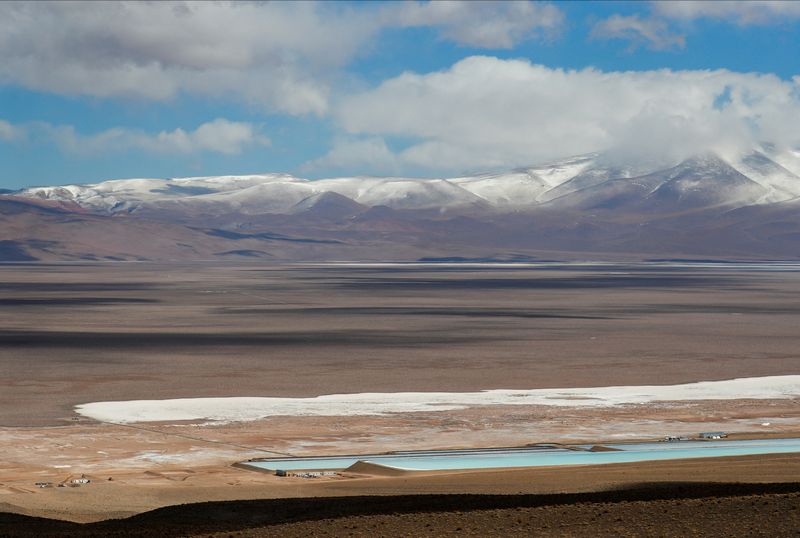By Ernest Scheyder and Clara Denina
(Reuters) - Rio Tinto (NYSE:RIO)'s $6.7 billion buyout of Arcadium will give it a suite of lithium filtration technologies that are poised to revolutionize how the metal is produced for the electronics and electric vehicle industries.
Arcadium's expertise in so-called direct lithium extraction (DLE) is the real prize for Rio, analysts said, and vaults it into contention with Eramet, Sunresin, Exxon Mobil (NYSE:XOM) and others aiming to make the technology commonplace in coming years.
The DLE industry is expected to grow to more than $10 billion in annual revenue within the next decade by supplying lithium for EV batteries in hours or days, not months or longer as with existing large, water-intensive evaporation ponds and open pit mines.
While DLE technologies vary, they are comparable to filtration used by common household water softeners and aim to extract about 90% or more of the lithium from brines, compared to about 50% using ponds.
No one has launched a commercial DLE operation without ponds, although multiple companies are racing to be first.
Arcadium, through a predecessor company, was the first to develop an early version of a DLE technology in the 1990s at an Argentina lithium brine site that is still operational today.
While that site uses ponds in tandem with DLE, Arcadium's decades-long experience with the technology makes it a tantalizing prize for Rio as it aims to develop lithium deposits in Chile, where officials are phasing out ponds and requiring DLE, and elsewhere.
"It (DLE) is actually the solution to provide the lithium that the world needs," Rio CEO Jakob Stausholm told investors on Wednesday after announcing the all-cash deal. It values Arcadium at a 90% premium to its share price before Reuters first reported the companies were in talks last Friday.
Arcadium's Argentina DLE operations are located near a DLE project that Rio paid $825 million for in 2022, though that project has yet to produce lithium. Arcadium's engineers have already met with Rio's DLE team, Stausholm said.
"There's a lot ahead of us and we haven't explored it fully, yet it's the right technology," he said.
Though Rio has long been a leader in hard rock mining, it has far less expertise in the chemical processing at the core of lithium production.
DLE, for example, is just one part of a complex process that can involve more than 20 steps, including pre-treatment of a lithium brine and crystallization.
Each brine deposit can also have different chemical compositions - including various levels of calcium, magnesium and other metals - that must be carefully analyzed. All of those steps have been studied in depth for years by Arcadium.
"The key to unlocking initial implementation of DLE tends to be that know-how plus infrastructure," Arcadium CEO Paul Graves told investors on Wednesday. "But once you have unlocked it, it's incredibly quickly replicable."
Arcadium, through a predecessor company, also holds a stake in EnergySource Minerals, a DLE developer that licenses lithium technology to SLB and others. When that investment was announced last December, executives said it could start commercial production by 2025.
"Rio Tinto is paying a premium for Arcadium in part for its intellectual property around DLE technology," said Chris Berry, an independent lithium industry consultant.
DLE RIVALS
Rio's bid to make DLE mainstream will face intense competition, including from some of the very people who helped make Arcadium a DLE leader.
Arcadium's Argentina DLE site, for example, was developed by a scientist who is now chairman of International Battery Metals, which has developed a modular DLE facility that Exxon, Chevron (NYSE:CVX) and others have considered licensing.
Albemarle (NYSE:ALB), the world's largest lithium producer, is also testing DLE in Arkansas near its existing bromine operations and in Chile. SQM, which is headquartered in Santiago, agreed with Chile's government this year to a plan that will see its production increase in part due to DLE.

"DLE is about being a chemical processing expert. Companies like Arcadium, Albemarle, SQM, they have a lot of expertise that they can put to work in that area," Eric Norris, head of Albemarle's energy storage business and a former executive at an Arcadium predecessor company, told Reuters earlier this year.
Vulcan Energy, privately held EnergyX, Standard Lithium and others are also advancing their own versions of DLE technologies.